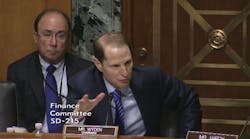The chairman of the Senate Finance Committee has agreed to drop an initial proposal to increase the revenue from the heavy vehicle use tax (HVUT) by raising the cap on the tax from $550 at 75,000 lbs. ground vehicle weight to $1,100 at 97,000 lbs. The higher cap had been part of a short-term fix for the highway trust fund proposed by committee Chairman Ron Wyden (R-OR).
The elimination of the higher HVUT on larger trucks was part of modified proposal negotiated June 25 between Wyden and the committee’s ranking Republican, Orrin Hatch (R-UT), before the committee met Thursday to start work on the bill. Sens. John Thune (R-SD) and Hatch spearheaded efforts to strike the HVUT increase.
On Thursday, Wyden presented the modified proposal, and most members of the committee discussed the plan and potential amendments that they may offer when the committee resumes consideration of the highway trust fund “patch” during the week of July 7.
Committee members have filed 46 potential amendments to the highway trust fund bill, although it is clear that Wyden will oppose a number of them.
“To me, the prime terrain for the bipartisan compromise is that area that is in between the hot-button issues…and the accounting gimmicks that don’t produce funds that help pay our bills,” Wyden said at the conclusion of Thursday’s session. “Let’s put those two areas off limits, and in between those two areas there are lots of opportunities for discussion.”
One of those “hot-button issues” most definitely is an amendment that Sen. Sherrod Brown (D-OH) plans to offer regarding worker classification. During the committee session, Brown cited trucking and construction in particular as leading offenders. Brown’s amendment, which would raise $5.7 billion over 10 years, is basically the text of a bill (S. 1706) on worker classification that he introduced in November except that the new language exempts professional services in specific fields – health, law, engineering, architecture, accounting, actuarial science, consulting, financial services and insurance.
Another controversial measure – one that the trucking industry would embrace – eyed by Sen. Thomas Carper (D-DE) would restore the purchasing power that the federal gas and diesel taxes had in 1993 through three annual 4-cent increases followed by an annual inflation adjustment. Carper’s proposal is not surprising; he floated the idea in May at a conference on transportation infrastructure hosted by the American Trucking Assns.
Sens. Chris Murphy (D-CT) and Bob Corker (R-TN) have proposed essentially the same fuel tax increases except that their 12-cent increase would come over two years rather than three. Neither Murphy nor Corker is a member of the Finance Committee, however.
In the event his own amendment is deemed too aggressive, Carper has signed on to support a potential amendment sponsored by Sen. Michael Enzi (R-Wyo.) to begin indexing the current tax rates annually at the rate of inflation.
In the coming days, Wyden and Hatch plan to talk with House Ways and Means Committee Chairman Dave Camp (R-MI) to determine what spending and revenue provisions would be acceptable to both sides.
To view a recording of Thursday’s Finance Committee session, click here.



